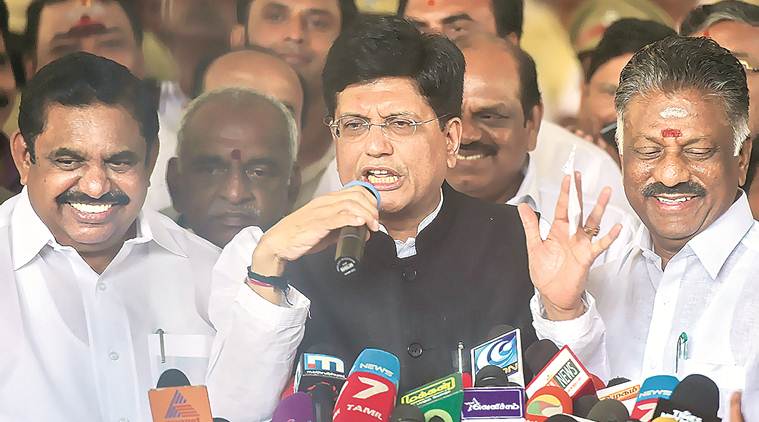
With Lok Sabha election dates expected to be announced soon, the Railways Ministry has fast-tracked approvals to MPs who have demanded additional train stops in their constituencies across the country. Records show that the ministry has approved at least 500 extra stops this year, apart from giving its consent to a new railway zone in Andhra Pradesh.
After exercising restraint for the better part of its tenure since 2014, the 500 additional stops, all approved by the NDA government in the last three months, is about a 200 per cent jump from 2017-18, when records show only 154 such stops were approved.
READ | Eye on Andhra votes, Piyush Goyal announces new railway zone, goes against report by internal panel
Over the past few months, Railway Minister Piyush Goyal has greenlit a large number of requests from party MPs, colleagues in the Council of Ministers as well as allies, who have all wanted popular mail/express trains to stop for a few minutes at stations of their choice. The activity has gained pace before the Model Code of Conduct kicks in, sources told The Indian Express.
Officially, Railways terms such stops “experimental stoppages” for six months but they are hardly ever withdrawn even if Railways stands to gain little from these halts.
Elected representatives seek stoppages for popular trains by writing to the minister. Each request is processed separately in terms of viability and goes to the minister for final approval.
As per Railways calculations, a stoppage to a long-distance train costs the transporter between Rs 12,716 and Rs 24,506, depending on traction, composition and other factors. This money needs to be recovered from ticket sales in the halt station and additionally, the halt should not adversely impact the overall running time of the train.
In reality, railwaymen frown on requests for stoppages because the transporter mostly loses money and it impacts mobility in the network. Officials said that Railways loses around Rs 1 crore per day on account of unwanted stoppages, as per 2014 calculations. On paper, each stoppage request fulfils some criteria or the other, once the bureaucracy gets the signal from the political dispensation that it must be done, said sources.
Railway Board Member (Traffic) Girish Pillai said the stoppages do not hurt mobility. “In the viability assessment for each stoppage request, we make sure that they do not affect mobility. They are distributed that way,” he told The Indian Express. “In any case, they are experimental halts.”
Sources said until recently, the government had shown restraint in fending off such requests, that usually flood the ministry, especially peaking during each Parliament session. In the weekly “open house” with MPs in Parliament, Goyal has refused stoppage requests often citing the need to speed up the trains and non-viability of the stoppage request.
MPs generally want stoppages, new trains, increase in frequency or extension of existing trains. In this wishlist, stoppages are often viewed as “low hanging fruits”.
By January 31, Railways had approved 291 stoppages this financial year. Around 200 more were already approved by Goyal and were awaiting implementation around that time, sources said.
These are also mostly on routes which are choked and any stoppage adversely affects the network capacity. Politicians also make a big deal out of stoppages. Union minister Babul Supriyo posted celebratory tweets after his long-pending request to halt the Howrah Rajdhani Express at his constituency Asansol was granted by Goyal last year.
ALSO READ | Piyush Goyal launches Rail Drishti Dashboard, says ‘ours is an accountable govt’
The push to grant stoppages in the last leg of the tenure notwithstanding, the NDA has been much more economical than the previous UPA government in terms of approving stoppages. In the last year of the UPA government in 2013-14 alone, it had allowed 900 stoppages. And in the five years of UPA-II, 2,472 stoppages were added to trains. In comparison, the NDA has so far allowed half of that, even with Goyal’s recent approvals.
In 2014, Railways tried to withdraw some 1,200 experimental stoppages, mostly granted during the UPA tenure. However, the plan found no political backing. “Unwarranted stoppages kill network capacity and also cost money. They inconvenience the system. For whatever reasons our plan of getting rid of those stoppages could not go through,” said Devi Prasad Pande, former Railway Board Member Traffic who was in office in 2014.